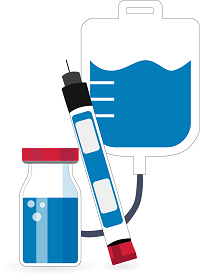Patient Materials
Biosimilars are safe and effective medications for treating many illnesses such as arthritis and cancer
Biosimilars are safe and effective medications for treating many illnesses such as chronic skin and bowel diseases (like psoriasis, irritable bowel syndrome, Crohn’s disease and colitis), arthritis, kidney conditions, and cancer.
Biosimilars are FDA-approved biologic medications that are compared to another medication – the original biologic.
Biologic medications are generally made from natural sources and developed using advanced science.
Same expected benefits and risks
Compared with their original biologics, biosimilars:
- Are made with the same types of natural sources
- Are given the same way
- Provide the same treatment benefits
- Have the same potential side effects
- Have the same strength and dosage
Access
Biosimilars may provide patients with more access to important treatments:
- More options
- More competition in the health care market
- Lower costs
Safe and effective
FDA makes sure biosimilars are as safe and effective as the original biologic by:
- Approving biosimilars after a careful review of data, studies, and tests
- Monitoring safety and effectiveness after approval
- Checking for medication quality during production
- Reviewing patient safety reports made to FDA
Frequently asked questions
What are biological medications?
Biological medications (also called biological products) can be made of sugars, proteins, living cells, tissues or a combination of these. They are made from natural and living sources like animal and plant cells, and microorganisms such as bacteria or yeast.
Biological medications are usually more complex than other drugs. They are often more complicated to purify, process, and manufacture.
What is a biosimilar medication?
A biosimilar is a biological medication. It is highly similar to a biological medication already approved by the FDA – the original biologic (also called the reference product). Biosimilars also have no clinically meaningful differences from the reference product. This means you can expect the same safety and effectiveness from the biosimilar over the course of treatment as you would the reference product. Biosimilars are made from the same types of sources (e.g., living cells or microorganisms) and are just as safe and effective as their reference products.
Will I save money by using a biosimilar?
Reducing costs is one reason Congress created the FDA approval pathway for biosimilar medications. However, FDA does not regulate whether insurance companies cover or reimburse the cost of biosimilars. If you have insurance, check with your insurance provider to find out what’s included in your plan. If you are covered by Medicare or Medicaid, the Centers for Medicare & Medicaid Services (CMS) and plan providers can generally provide this information.
Is it safe to take a biosimilar if I started treatment on the reference product first?
Generally, biosimilar medications can be used whether or not you have been treated first with the reference product. Always talk to your health care provider about available treatment options and potential risks and benefits.
How will I know if I’m using a biosimilar for my treatment?
Talk to your health care provider about the medications you are prescribed or are taking. Often, biological medications, including biosimilars, are given in a hospital or an infusion center. Talk to the doctor or nurse who is giving you the treatment. If you have a prescription, your doctor or pharmacist can tell you what you are prescribed and what you are given at the pharmacy.
How are biosimilars different from generics?
Biosimilars are like generics in some ways, in that, both types of medications are compared to a reference (original) product for approval. Biosimilars and generics are both versions of previously FDA approved medications and may offer more affordable treatment options to patients.
Biosimilars and generics are approved through different abbreviated pathways that avoid duplicating certain costly clinical trials.
Both biosimilar and generics go through a rigorous review process. Once FDA-approved, these medications are just as safe and effective as the reference products they are compared to. But, there are differences between biosimilars and generic drugs. For example, biosimilars are generally made from natural and living ingredients and generics are often made from chemical ingredients.
In contrast to a chemical, which is synthesized and can be generally copied, a biologic medication is made from natural and living sources and cannot be exactly copied. So, the information needed to demonstrate that a biologic is biosimilar to another biologic can be much more extensive than what is needed for a generic.
Talk to your doctor to learn more.
Additional resources
- Consumer Update (CU) (Spanish Version)
- Biosimilars Basics infographic (PDF - 388 KB) (Spanish Version)
- What Is A Biosimilar? (PDF - 285 KB) (Spanish Version)


